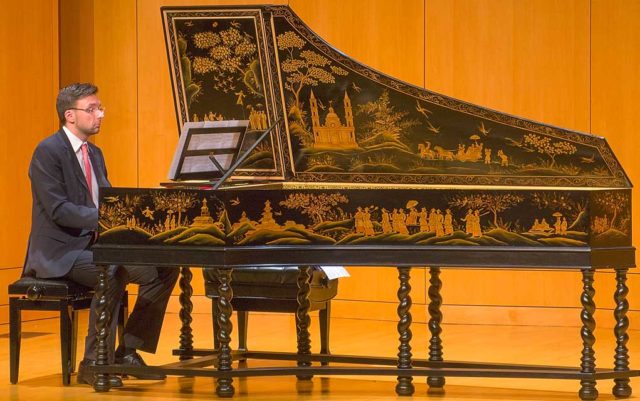
Vienna’s rich musical heritage of the Classic-Romantic periods is very familiar to audiences. But for a full century before Haydn or Mozart ever set foot in Vienna, the Austrian capital had a musical culture that scholar/performer Mario Aschauer calls “a phenomenon unique in music history.”
Between 1637 and 1740, four consecutive Hapsburg emperors were trained musicians and composers. “They had an amazing court (music establishment),” Aschauer explains. “They had international personnel and produced an unspeakable amount of music in pretty much every genre that was popular at the time.”
To open the door on these riches of the Baroque era, the Boulder Bach Festival has invited Aschauer to present “A Journey to Vienna with Mario Aschauer,” a concert of music from the Austrian court, to be presented Thursday, Dec. 8 in Boulder and Saturday, Dec. 10 in Longmont. The program features both operatic and instrumental selections, performed by Aschauer on harpsichord; the Bach Festival’s director, Zachary Carrettin, on Baroque violin and his recently revived cello da spalla; and by soprano Jennifer Bird-Arvidsson, who performed with the Bach Festival in last season’s performance of Bach’s St. Matthew Passion.
The collaboration between Carrettin and Aschauer is a bit of a happy accident. Carrettin came to Boulder and the Bach Festival from Sam Houston State University in Texas, where Aschauer was his replacement on the faculty. The two had never met, but Aschauer kept hearing from his students how much they had in common. “After a while, I just gave in and said, ‘OK, I’ll call him,’” Aschauer says
“We had so many interests in common that we had a hard time getting off the phone,” Carrettin recalls. “I realized that not only is this someone with whom I’d like to collaborate musically, but someone who can bring us repertoire that none of us knows, yet.”
Aschauer was working in the archives of the Imperial Court in Vienna, where he had found both harpsichord music by some of the six keyboard players employed there, and operas that had been written for court occasions, most of them performed once and then forgotten.
“The Hapsburgs understood that opera was extraordinarily suited for political propaganda,” he says. “For any major occasion at the court, an opera was composed. Most of the time it was a birthday gift or a name-day gift, or a gift for a wedding, and of course you can’t give a gift twice. It’s almost never that an opera was re-performed.”
Because the music was forgotten almost as soon as the performances were over, the parts were not kept. However, formal scores were presented to the emperor, because each in turn wanted to read the music during the performances, and these were kept. This is part of the material that Aschauer discovered, and it’s from which the program has been collected for the upcoming concerts.
The works are arranged in two groups or “suites” — the second specifically called that in the printed program. They include music by one of the emperors and court composers of different generations. There are pieces for keyboard alone, a sonata for violin and keyboard, and several arias with an obbligato instrument — an instrument that becomes a duet partner with the singer. This type of aria was a particular specialty in Vienna.
“Viennese Baroque opera requires a huge ensemble of different instruments but these instruments never play together,” Aschauer says. “There are arias with violin solo and arias with cello solo and recorder solo and bassoon solo, and even with harpsichord solo. These special instruments keep the operas acoustically more interesting.”
The Dec. 8 and 10 concerts will feature arias for soprano with harpsichord alone as the obbligato instrument, with violin, and with cello. Carrettin will play the last of these on his cello da spalla, a smaller version of the standard cello that is designed to be held on the shoulder and played like a cross between a violin and a guitar.
He and Aschauer will also play a Sonata for violin and harpsichord by George Muffatt, one of the court composers. “This work is shocking at every turn,” Carrettin says. “I would say it’s the most harmonically exploratory work I’ve encountered from the 18th century, with beautiful arioso melodies but harmonic motion that is so shocking and ahead of its time.”
Aschauer says the music from the Viennese Baroque court is “like a blind spot on the historical map of music history that is incredibly exciting to explore. And the program is almost a 3-D model of musical culture at the court.
“When you come to the concert, imagine you’re in Vienna in 1700, and you’re entering the castle in the old city of Vienna. You’re eavesdropping on some music making going on in the castle that night, and just let yourself be surprised.”
On the Bill: Journey to Vienna — presented by Boulder Bach Festival. 7 p.m. Thursday, Dec. 8, Grace Lutheran Church, 1001 13th St., Boulder, 7:30 p.m. Saturday, Dec. 10, Stewart Auditorium, 400 Quail Road, Longmont, Tickets: 720-507-5052, boulderbachfestival.org.














